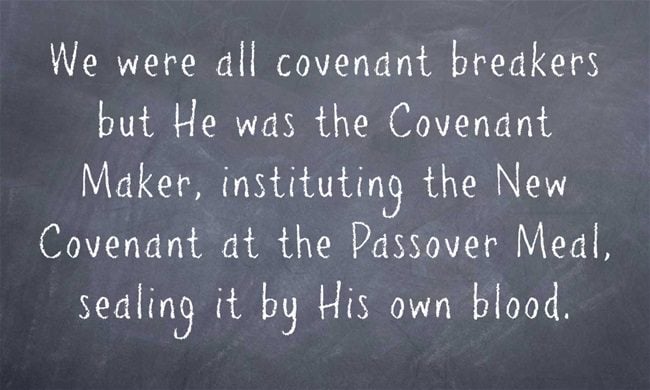There is the Old Covenant and the New Covenant but what is a covenant? What does the Bible define as a covenant?
What is a Covenant?
A covenant is so important to believers because it is an agreement ratified by blood by a God Who cannot lie and never abandons what He promises. It is the agreement between two parties, us and God, which are contained in the Scriptures which have been revealed to us. Marriage is like a covenant which is in effect until one of the parties die. The covenant made with Abraham was established by a cutting or the act of circumcision. The Hebrew word for covenant is “bĕriyth” and is called a covenant from the idea of cutting since this was customary in Abraham’s day when solemn agreements were made and one in which they were to pass between the divided parts of victims, which is seen in animal sacrifices. This was the same covenant which God made with Abraham (Gen 17:2). In this covenant Abraham asked God “Lord God, how am I to know that I shall possess it?” He said to him, “Bring me a heifer three years old, a female goat three years old, a ram three years old, a turtledove, and a young pigeon.” And he brought him all these, cut them in half, and laid each half over against the other” (Gen 15:8-10).
The Old Testament Covenant with Abraham
The story of the covenant between Abram and God, first related in Genesis 12 is a story that is interwoven throughout the Old Testament and the New Testament (Gen. 12:1-3, 18:18, 22:18, 26:4, 28:15; Acts 3:25; Gal. 3:8). Abrahams calling by God contains particular genre characteristics that are unique. Abrams obedience to go from his country, his kindred, and his father’s house was a covenantal promise that was unconditional.1 His obedience resulted in blessings that have implications to this day because this royal grant-type of covenant “is a golden thread stitching together the whole Scriptural fabric.”2 This “golden thread” is linear and will extend into all eternity, reaching even those unborn children of God in an endless number of tomorrows. The evangelist Matthew addressed the Jewish people and was very much interested in the historicity of Abraham’s Promised Seed writing that “the generation of Jesus Christ, the son of David, the son of Abraham” was the unconditional fulfillment of that Promised Seed (Matt 1:1-17; Gen 12:1-3) and spoken of by God after the fall in the Garden (Gen 3:15).
Abraham personified “the just shall live by faith,” and as such was the prototype of living by faith. He moved by faith, he left (Ur) by faith, he left his family by faith, he went into the unknown and unseen by faith, and God’s covenantal theme, beginning with Noah and reiterated in Abraham’s faith, will be seen throughout the entire Bible.3 Just how full of a realization of the comprehensive nature and world-encompassing blessing that this covenant would come to be would not be fully known for thousands of years.4 Paul, in striking a blow against the Judaizers, brilliantly linked the past with the present in Galatians 3:7-8 showing that Abraham was saved by faith and that those who claimed to be his children was not enough to be saved because the fact that “all nations shall be blessed through Abraham” (Gen 12:3) is about grace and not race.5 Paul was adamant about dropping the boundary markers that inevitably provoked divisions between the Jews and the Gentiles.6
Although it appears that God’s initiation of His redemptive plan may have begun with Noah, with Abraham’s call and God’s covenantal promise to him being first given in Genesis 12, there is from this point forward, the hope that humanity may yet be reconciled to God. Central to this hope of reconciliation comes from the divine promises made to Abraham. There is no doubt that the primary importance for reversing the consequences of what took place in the Garden of Eden began with the promise given to Abraham and that came to fruition when Christ died on the cross. Abraham’s example is that faith is marked by obedience and not just belief and that the just shall not only live by faith but be saved by faith in the Promised Seed, Jesus Christ. The meaning of this Old Testament narrative in Genesis 12 is found directly in the text as a whole rather than in isolated segments in these historical accounts of speech and dialogues between God and Abram.
The New and Better Covenant
I saw Abraham’s call and to leave all that he knew to be familiar not dissimilar to what Peter, John, Andrew and Matthew all left behind. They left their own world and entered into a new one, one in which they were to begin in a new world but in a new life. Jesus’ call, like God’s call of Abraham, was an effectual call and would have great similarities to our own calling. Most of us will not have such an extraordinary call from God, nor will we have to leave everything behind but the amazing thing is that He would call us at all given the fact that we are wretched sinners who like the woman caught in adultery and deserved to be stoned to death. Jesus was the only one having the right to do so, yet he said, “Neither do I condemn you, no go and sin no more” (John 8:11). Neither will Christ condemn those who have repented of their sins, confessed them to God, apologized for their sinfulness, seen their desperate need for the Savior and then put their trust in the Only One Who can save them (Acts 4:12). That is the New Covenant and this is why it is better. It is better than better; it is the best that is possible.
Jesus Himself instituted the New Covenant during the Passover Meal in Matthew 26:26-28:
“Now as they were eating, Jesus took bread, and after blessing it broke it and gave it to the disciples, and said, “Take, eat; this is my body.” And he took a cup, and when he had given thanks he gave it to them, saying, “Drink of it, all of you, for this is my blood of the[c] covenant, which is poured out for many for the forgiveness of sins.”
Unlike the old sacrificial system where animals would have to be continually sacrificed and the sins were never taken away but only covered, Jesus own blood takes away all of our sins (John 1:29; 1 John 3:5). How much better is this covenant…one which not just covers them but takes them completely away? The word “forgiveness” in Greek is “aphesis” and literally means “a release from bondage or imprisonment.” This means that we can be released from the bondage of our sins which had imprisoned us. Now, Jesus Who says “I have the keys of Death and Hades” (Rev 1:18) has set us free in this truth (John 8:32). Now God says that “I will be a father to you, and you shall be sons and daughters to me says the Lord Almighty to become” (2 Cor 6:18).
Conclusion
Where Adam failed in obedience, Jesus succeeded. Where no one can keep the Law, He kept it perfectly for us. We were all covenant breakers but He was the Covenant Maker, instituting the New Covenant at the Passover Meal, sealing it by His own blood. A covenant is always ratified by blood or it is useless but the blood of the Perfect Lamb of God ensured that this would be the perfect sacrifice and the only one that God accepted. The so-called propitiation is the satisfaction made in Christ Himself so that we can now have peace with Him (Rom 5:1). The punishment due us was placed upon Him, who knew no sin (2 Cor 5:21) so that when the Father looks at us, He sees Christ’s righteousness. Most amazing is His grace. He gives us what we don’t deserve (that’s grace) while withholding what we truly do deserve (that’s mercy).
Another Reading on Patheos to Check Out: What Did Jesus Really Look Like: A Look at the Bible Facts
 Article by Jack Wellman
Article by Jack Wellman
Jack Wellman is Pastor of the Mulvane Brethren church in Mulvane Kansas. Jack is also the Senior Writer at What Christians Want To Know whose mission is to equip, encourage, and energize Christians and to address questions about the believer’s daily walk with God and the Bible. You can follow Jack on Google Plus or check out his book Blind Chance or Intelligent Design available on Amazon
1 Gleason L. Archer, A Survey of Old Testament: Introduction. (Chicago: Moody Publisher, 2007), 142.
2 Ibid., p. 183.
3 Michael David Coogan. The Old Testament: A Very Short Introduction. (Oxford: Oxford University Press, 2008), 115. Accessed January 23, 2014. EBSCO Host Library.
4 Ibid., p. 109.
5 Ronald S. Hendel. Remembering Abraham: Culture, Memory, and History in the Hebrew Bible (Oxford: Oxford University Press. 2005), 33.
6 Magnus Magnusson. Archeology of the Bible. (New York: Simon and Schuster Publishing, 1977), 34.
















